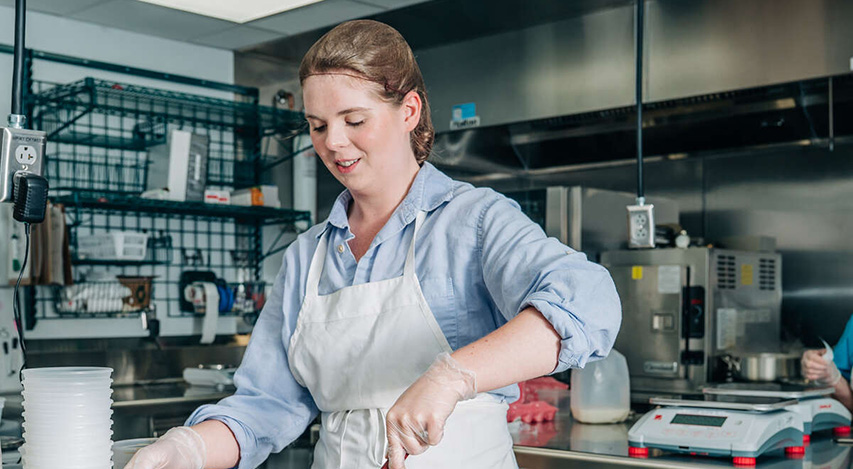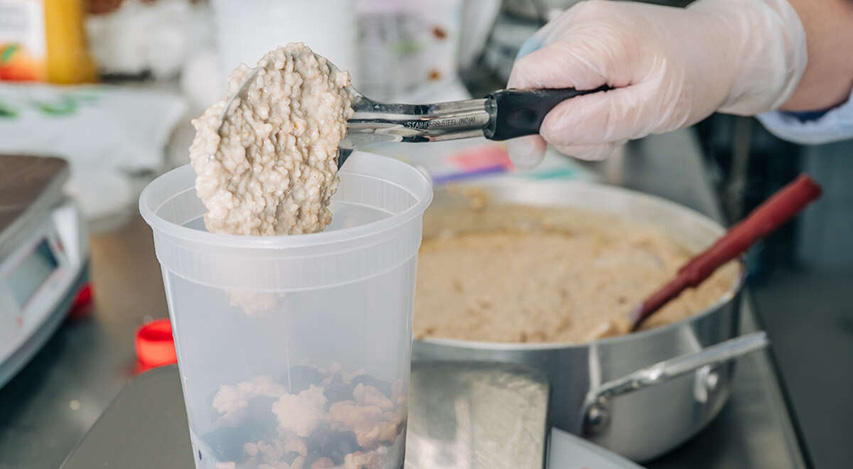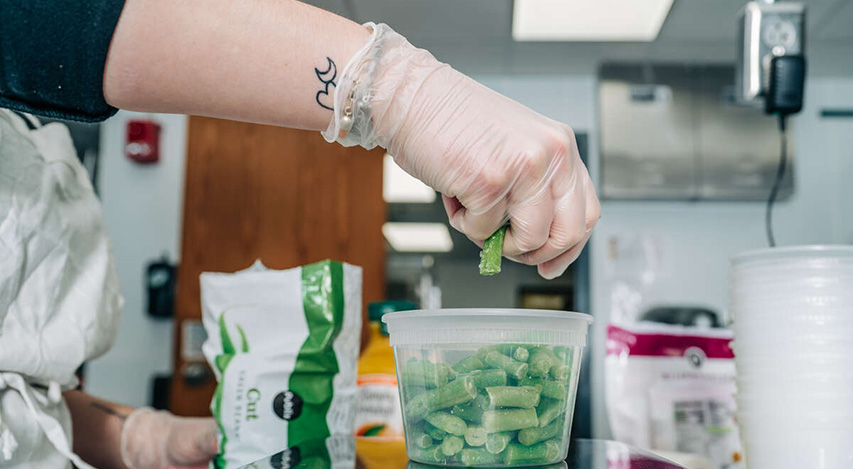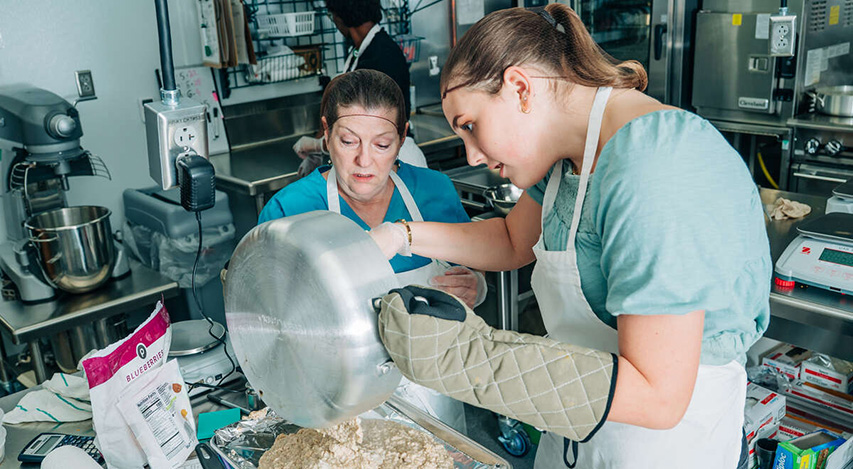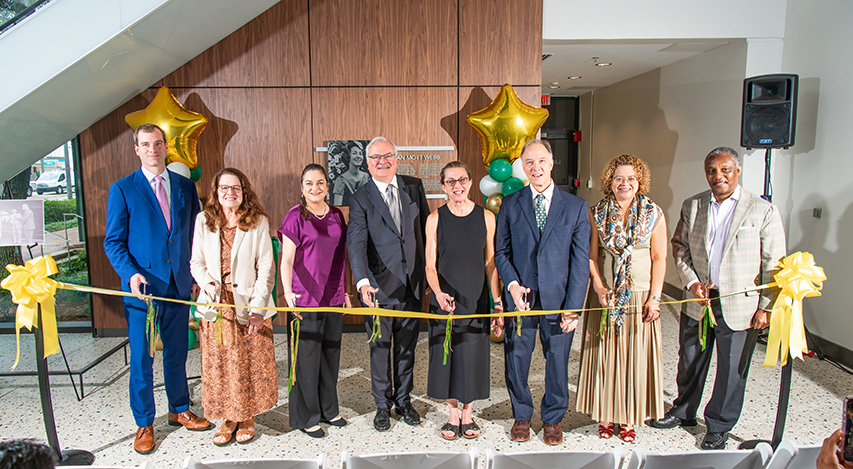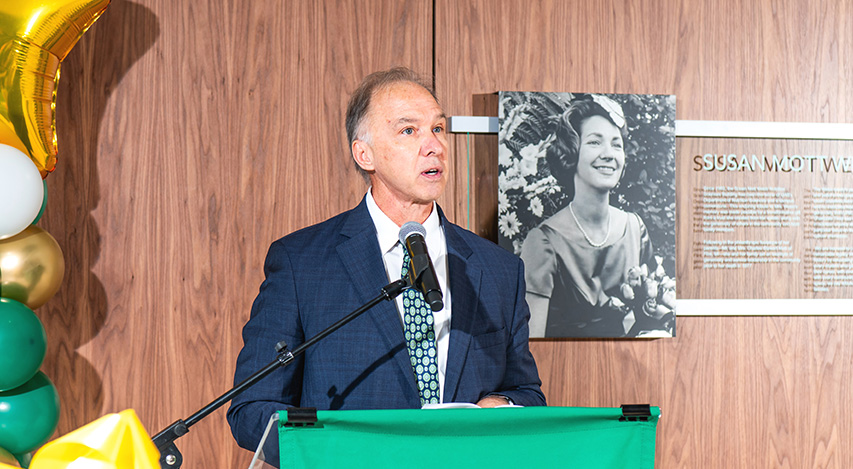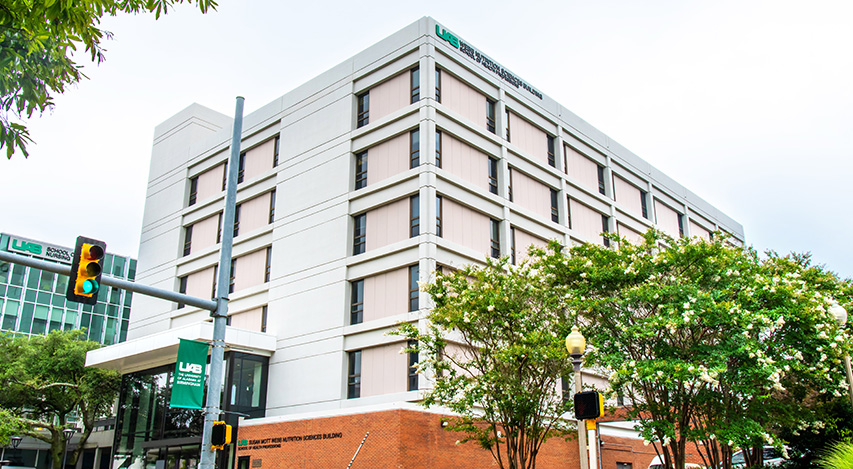A new tool in understanding and improving nutrition for all now resides at the University of Alabama at Birmingham. The Department of Nutrition Sciences is now home to a brand-new metabolic kitchen and a teaching kitchen, which will significantly enhance the department’s research, education, clinical and community outreach capabilities.
Housed in the newly renovated Susan Mott Webb Nutrition Sciences Building, the kitchen is equipped with professional-grade tools and staffed by registered dietitians. The renovation also included updates to the building’s lobby and atrium, creating a bright and modern environment, as well as the installation of a state-of-the-art calorimeter suite to support advanced metabolic research.
“These renovations set the tone for the future and are a reflection of our Department of Nutrition Sciences itself: a place of excellence,” said Andrew Butler, Ph.D., dean of the School of Health Professions. “All who enter will recognize this as a place of purpose where students, faculty and staff conduct essential work, and our clients receive advanced nutritional services.”
Completed in spring 2025, the metabolic kitchen allows researchers to develop precise dietary interventions for people with diabetes, obesity and heart disease — using real food, not just data.
The kitchen is designed to mass-produce menus and meals for large research studies, ensuring precise control over nutrient content and ingredient interactions.
UAB’s calorimeter suite includes three rooms designed to monitor a person's metabolism for 24 hours. This is critical since rates vary by time of the day, activity level, exercise and food intake. Each room will be available for meal testing. The flex room and the largest room can accommodate a stationary bicycle for exercise testing.
“I see this new facility as a game-changer for advancing research, education and community health both at UAB and throughout Birmingham,” said Kelly Berg, RDN, assistant professor and director of the metabolic kitchen. “It strengthens our position as a national leader in delivering clinically controlled meals and driving translational nutrition science forward.”
Key features of the metabolic kitchen include precision measurement tools for accurate ingredient quantification, specialized software for creating clinically controlled menus, and temperature-controlled storage including a walk-in freezer, commercial-sized cold storage and blast chiller for ingredient stability experiments.
A hub for learning and community engagement
Berg says the teaching kitchen enhances UAB’s reach by offering an interactive learning environment where students, study participants and community members can engage in hands-on labs, culinary demonstrations and outreach programs. By integrating research, education and outreach, the kitchen prepares students to lead in nutrition science and public health.
“Our students gain valuable, real-world experience working alongside experienced professionals, while our core staff provides the expertise needed to execute complex research protocols.” – Kelly Berg, RDN
Designed to serve a multitude of audiences, the teaching kitchen caters to students in UAB Nutrition Sciences programs and community members managing chronic conditions like obesity and diabetes. Equipped with state-of-the-art audiovisual technology, the space supports multimodal learning and research, enabling virtual lectures and recorded sessions.
The teaching kitchen also features visual aids such as overhead cameras for live, streamed and recorded demonstrations; interactive workstations with induction cooktops and modular setups for hands-on learning; appliances including induction cooktops, double ovens, industrial fridges and freezers; and specialized culinary tools like high-quality knives and tools for practical training.
These new kitchens will foster innovation and collaboration, translating scientific findings into practical applications. The metabolic kitchen will support studies on nutrient composition, ingredient interactions and food preparation methods, informing evidence-based health recommendations.
Majors. For your Major Decision.
Choose from over 150 majors and minors to customize your academic experience and allow your passion to become your profession.
Research areas include dietary interventions with customized meal plans for diabetes, heart disease, weight loss and more; food chemistry investigating ingredient interactions and their effects on taste, texture and nutrition; sensory studies analyzing how preparation methods influence flavor, aroma and appearance; and sustainability and waste evaluation techniques to reduce waste and improve resource efficiency.
The teaching kitchen will enhance nutrition education, providing students and community members with hands-on skills and knowledge. It will host classes, labs, cooking demonstrations and community-focused events, bridging education, health and community engagement.
“The new kitchen will allow for highly sophisticated and accurate research studies to be conducted and will greatly enhance the learning experience of our students,” said Barbara Gower, Ph.D., chair of the Department of Nutrition Sciences. “This firsthand experience is critical for seeing and understanding how different ingredients interact.”
With these innovative kitchens, UAB is poised to lead the way in nutrition research and education, empowering students, professionals and community members to improve health outcomes through practical, evidence-based approaches.
